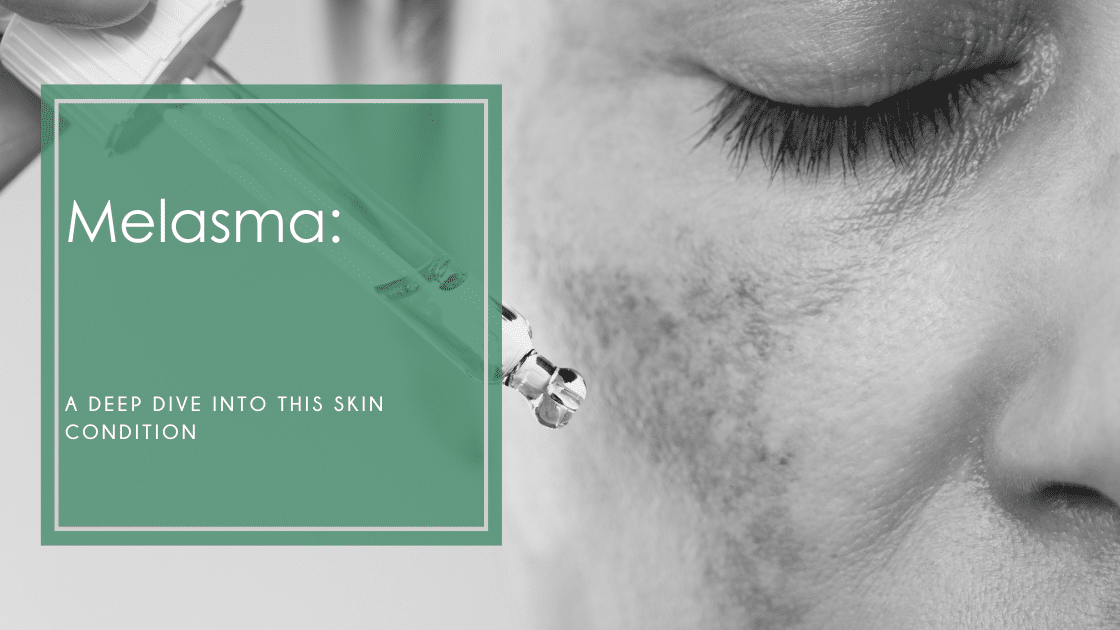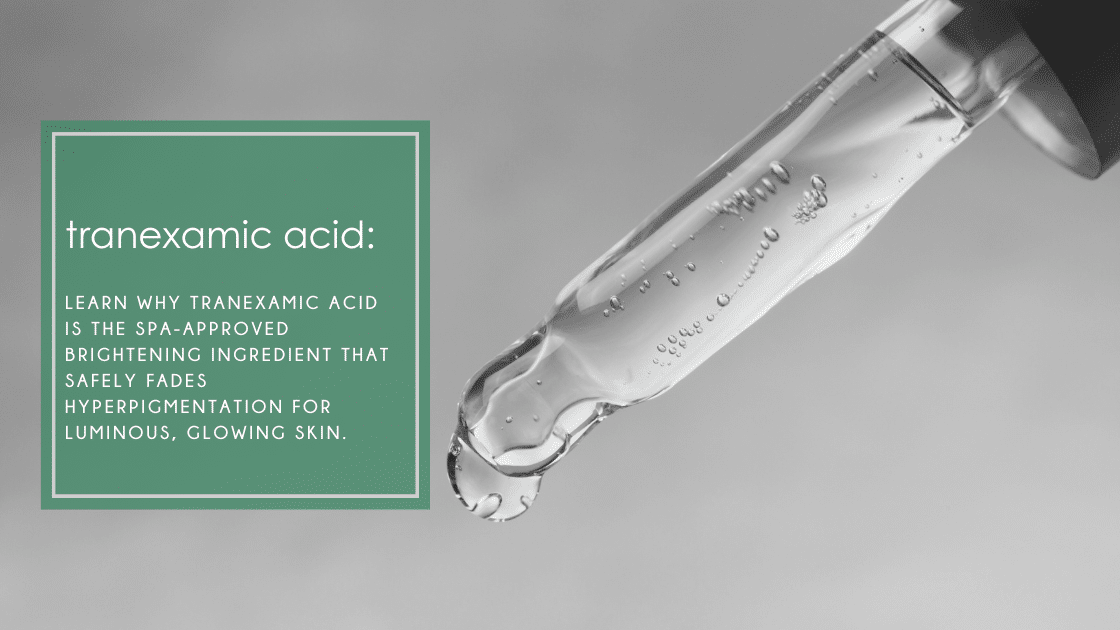Melasma: A Deep Dive Into This Skin Condition
Melasma: Myths and Truths
Melasma isn’t just another hot topic we are here to discuss – our owner, Samantha has been battling this skin condition for several years. If you follow her on Instagram, you know she’s transparent about her struggles and determination to heal her skin. Samantha knows if she can find the solution, she will be able to help others heal their skin too. Melasma is more than a skin condition – it’s a complex web of hormones, health, and lifestyle.
Let’s dig into: what it is, what causes it, and most importantly, what can we do to manage our skin?
What Is Melasma?
🌟 Melasma is a skin condition resulting in dark brown or grey patches on the face, typically on the cheeks, mouth, and forehead. Melasma is more common in women due to hormonal changes, such as pregnancy when dark patches begin to appear. This is also known as the “mask of pregnancy”. Melasma is more common in women with darker skin tones, such as Mediterranean, Indian, Hispanic, and Middle Eastern. It is a harmless skin condition, however, it affects a woman’s appearance and self-esteem forcing her to search for solutions to fix her skin.
What Does Melasma Look Like?
Melasma should not be confused with freckles or sun spots. Unlike small sun spots, this presents itself as large, irregularly shaped patches that appear on the cheeks, nose, around the mouth, and forehead. There are 3 types: Epidermal, Dermal, and Mixed.
🌱 Epidermal Melasma: Dark, brown color, a well-defined border, and sometimes responds well to treatments.
🌱 Dermal Melasma: Light brown or bluish color, blurry border, and doesn’t respond well to treatments.
🌱 Mixed Melasma: The most common type, has both bluish and brown patches and shows some response to treatments.
What Is The Cause?
☀️ Melasma is thought to be triggered by sun exposure, but multiple factors cause the skin to darken and it’s not all sun-related. Fluctuations in hormones, such as estrogen and progesterone, especially during pregnancy, perimenopause, menopause, or when taking hormone replacement therapy (HRT). Heat is another trigger: hot and humid temperatures, hot baths, saunas, high-intensity exercise, sun, and spicy foods can trigger the skin to darken.
The American Academy of Dermatology shares that more research must be done. However, here are some of the reasons melasma may be triggered:
👉Sunlight
👉Pregnancy
👉Certain medications
👉Stress
👉Tanning Beds
👉Thyroid imbalances or diseases
Melasma is believed to be caused by an imbalance in the endocrine system, such as the thyroid, however, more studies need to be done. According to PubMed, “Regarding other endocrine alterations, thyroid abnormalities have been linked with melasma. However, the results of such studies are controversial, and none has been performed with an adequate methodology to support a reasonable hypothesis on these alterations in the pathogenesis of melasma.”
Why Is It Difficult To Treat?
💡 Melasma is difficult to treat because no study has proven the root cause. Most skin conditions are caused by internal imbalance and inflammation inside the body. Using skin-lightening agents can help, but they don’t rid the skin of dark patches. Melasma can be managed, but it does not go away. Our mission is to determine your root cause. With internal guidance, skin treatments, and topical skincare products, we can help lighten your skin.
Why Does Melasma Show Up During Pregnancy?
🧘♀️ The rapid fluctuation in estrogen and progesterone during pregnancy can trigger melasma. Rapid hormonal shifts stimulate melanocyte cells, responsible for our skin’s pigment. Many women see this pop up for the first time during their pregnancy.
Melasma, Perimenopause, and Menopause
🧘♀️ During this period in a woman’s life, erratic fluctuations in hormones especially during perimenopause make her more susceptible to melasma. During menopause when estrogen drops, the skin can be triggered. And other women don’t notice any signs until they begin hormone replacement therapy (HRT). HRT can rapidly increase estrogen and trigger inflammation in the skin.
Sun And The Skin
☀️ Interestingly, most estheticians and dermatologists believe that melasma is caused by sun damage. However, that is not always the case. The sun triggers the skin to darken due to UV radiation, but heat is the main trigger. We always recommend protecting the skin from the sun; anything that can heat your body worsens your skin. Our owner, Samantha, suffers from melasma and noticed her skin darkens when she takes frequent hot baths. Plus, just being outdoors in the shade darkens her skin. As an esthetician for over 20 years, Samantha avoids direct sun like the plague, so she is a shade-seeker, yet her skin still gets darker in the summer months no matter how careful she is.
What Medications Cause The Skin To Darken?
💊 Certain medications trigger inflammation in the body resulting in darkening of the melanocyte cells. The melanocyte cell becomes overactive and presents itself as large, dark patches on the skin. A study by PubMed states, “The main drugs implicated in causing skin pigmentation are nonsteroidal anti-inflammatory drugs (NSAIDs), antimalarials, amiodarone, cytotoxic drugs, tetracyclines, heavy metals, and psychotropic drugs.” Certain medications cause the skin to become sensitized to the sun, these medications can also cause the skin to darken because they affect the melanocyte cell.
Thyroid And Melasma
🌱 Few studies have been done on this, however, dermatologists are noticing an increase in skin-darkening symptoms in women who suffer from mild, moderate, and severe thyroid symptoms. Melasma may be the first sign that your thyroid is imbalanced, especially if you use at-home topicals and treatments to lighten your skin with no success.
Holistic Approaches
🌱 Functional medicine doctors treat the whole body for melasma and look inside to see what imbalance is causing the skin to react. You can start by finding a holistic doctor, such as a Naturopathic or Functional Medicine doctor who can do a health exam, that includes labs for blood draws, urine, and stool samples. This tests for thyroid, hormonal imbalances, inflammation, stress, and vitamin deficiencies. We don’t like to recommend doing specific diets, however, an anti-inflammatory diet, lowering your stress levels, avoiding extreme temperatures (including high-intensity exercise) and saunas, taking supplements recommended by your doctor, and getting plenty of rest can help reduce inflammation and manage your skin. Partnering with a naturopathic doctor and esthetician to help you on both the inside and outside will help you get to the root cause of your melasma symptoms and lighten your skin for good.
Can You Prevent Skin Darkening?
🌟 Conventional research doesn’t fully understand skin triggers. All women experience a fluctuation in hormones during pregnancy, perimenopause, and menopause, some women suffer from melasma and others never see a change in skin pigmentation. The same goes for medications, why do some people experience this skin condition when taking medication and others don’t?
How To Treat
🧴 Topicals: We recommend using skin lighteners, such as Tranexamic Acid, Retinol, and Vitamin C to lighten your skin at home. Pairing skin lighteners with facial treatments maintains results and prevents skin from darkening.
🧖♀️ Treatments: We recommend doing facial treatments to help lighten your skin, such as our BioRePeel. We also love our Microchanneling treatments. Microchanneling infuses a skin-brightening serum that contains salmon DNA, Vitamin C, and Glutathione to lighten dark spots.
If you follow us on Instagram, you have watched Samantha’s skin treatment she did to help lighten her melasma. She paired the BioRePeel with microchanneling. She uses retinol plus a serum with bakuchiol and melatonin at night. During the day she uses a Transexamic acid serum to spot treat. She also eats an anti-inflammatory diet and is working with a naturopathic doctor to help her during perimenopause symptoms so her hormones regulate. It has been an uphill battle, but she is in the fight with you! And won’t give up until she finds a cure.
Ready to take control of your Melasma?
💻 Book your first appointment now! Melasma may be challenging, but you are not alone in this fight! With the right treatments, lifestyle, and guidance, healthy skin is within reach. Let us help you with your skin – book your first appointment today!
❓Have questions about your skin? Drop a comment below – we’d love to help!




